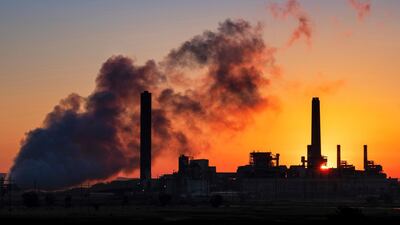The time has come for the nations of the world to get behind sustainability and turn the tide of climate change. And Abu Dhabi Sustainability Week (ADSW), which began yesterday, will give them a forum to discuss how to do so. In October, the Intergovernmental Panel on Climate Change issued an ominous warning: global temperatures look set to rise to 3C above pre-industrial levels by 2100, far higher than the target set by the 2015 Paris Climate Accords. With it, low-lying waterside nations such as Bangladesh and Comoros could be submerged. The world as we know it would be fundamentally changed.
And yet, despite the climate change denial peddled by world leaders such as US President Donald Trump and Brazil's Jair Bolsonaro, the global race to renewables has begun. Naturally the oil-rich UAE is exposed to the effects of a reduction in fossil fuels but it is resilient, able to reinvent itself. Indeed, the UAE Energy Strategy pledges to reach 44 per cent clean energy by 2050. That is why Abu Dhabi is an obvious location for this global discussion. Unlike much of the world, and against the odds, the country is using ingenuity and technology to take a lead in renewable energy and sustainable farming. For instance, Abu Dhabi's Masdar City – an ADSW co-host – is piloting a project allowing city-dwellers to grow their own food in recycled shipping containers. It is one of a host of environmental schemes that offer a template worth emulating.
With the world's population expected to exceed nine billion by 2050, the challenge is on to ensure food is produced and distributed efficiently and sustainably. Well aware of the threat of climate change and rising sea levels, UAE public figures have issued a call to action under the hashtag #WeAreCommitted. It is a message that will resonate with world leaders and thousands of attendees at ADSW.
Put simply, we must all do more to tackle waste at a governmental, corporate and personal level. But this is not about regressing to a pre-industrial mindset. Rather, it is about achieving a balance between growth and sustainability that does not further destroy the planet we share. From the Irena General Assembly today to the Zayed Sustainability Prize, due to be awarded on Monday, ADSW will illuminate a path to achieving that end.
The geographical concentration of fossil fuels has produced the world we know today. But this is the renewable century. With the adoption of renewable energy will come global changes – in trade, alliances and the distribution of global power. In ADSW we can see that new world under construction. But ultimately, talk alone will not bring change. Leader must take home the insights offered this week and act upon them, because the future of the world depends on it.

